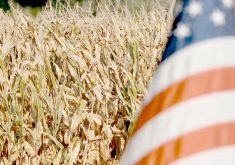First, the United States brought down the boot on Canadian pig and cattle exports with its country-of-origin labelling legislation.
Then a string of countries banned Canadian pork because of H1N1.
More recently, the European Union strangled Canadian flax exports because of trace amounts of unapproved genetically modified material it had never before bothered about.
And then two weeks ago, China shut down Canadian canola shipments by suddenly becoming concerned about blackleg.
If the world has been trying to convince Canadians that protectionism is running riot in export markets, it has succeeded, say exporters and analysts.
Read Also

Sugar beet harvest underway in southern Alberta
Alberta Sugar Beet Growers hosts field tour to educate the public on the intricacies of the crop, its harvest process, and contracts with Lantic Sugar
“There are a number of issues out there right now that are undermining our ability to export, there’s absolutely no doubt about that,” said Ontario Soybean Exporters Association secretary manager Dave Buttenham about the recent string of trade blockages.
“The flax situation is front and centre.”
Because protectionism is a sin virtually no government wants to admit to – and there are sanctions against protectionism in the World Trade Organization – countries don’t admit that they are inspired by a desire to block imports.
But economist Larry Martin of the George Morris Centre in Guelph, Ont., said he is convinced he knows why pork, flax and canola, as well as nonagricultural goods, are increasingly snarled when Canadians try to export them.
“Of course it’s attached to protectionism,” he said, laughing about the excuses countries give for the barriers.
“Ever since the WTO came in they’ve had to use nontariff trade barriers if they want to block trade, so that’s what they’re doing.”
Canadian Federation of Agriculture president Laurent Pellerin said many have predicted that the economic slump would cause an upsurge in protectionism, and that appears to be occurring.
“In the last couple of years, with this very difficult economic situation, there is probably an instinctive mood to go back and protect your own domestic market,” said Pellerin, a Quebec hog and dairy producer.
Canadian farmers, as efficient, low-cost suppliers to many world markets, quickly become a target.
“We export products all over the world, so a lot of people are looking at what we are sending them,” Pellerin said.
“There is always protectionism when you have competitive products like we produce in Canada. We are very aggressive competitors in the world market and some people see that as a threat and they want to try to protect themselves from it.”
Martin said the WTO forced governments to become more crafty with trade restrictions because it made it difficult to impose tariffs.
The U.S. has not only used COOL to cut the flow of pigs and cattle into its domestic market but has also allowed new border security regulations to crimp trade.
“I don’t think there’s any question that the U.S. has been using their security as a nontariff barrier,” said Martin, who is speaking to the American Bankers Association about protectionism in the next month.
He speculated that China could have a number of motivations for its canola ban on top of commercial concerns with its domestic rapeseed crop.
One is a “get tough” attitude it may be trying to show its people after a string of problems with environmental pollution and food safety problems, including poisoned baby food.
“My guess is that some of what they are doing is posturing for their own people,” he said.
Another possible motivation is to show buyers of Chinese products, such as Canada, that China is also a big market for them, so they should not take it for granted.
“Because of their government structure, they can act boldly like this,” Martin said about the communist nation.
Buttenham said the string of trade snarls is making agricultural exporters antsy.
“As we crawl out of the recession, there seems to be more of a protectionist sentiment around the world, and that doesn’t help our outlook.”
Pellerin said the list of recent trade headaches may be longer than usual, but Canadian farmers never seem to be free from protectionism.
“I have been in farming for 40 years and there is always something,” he said.















